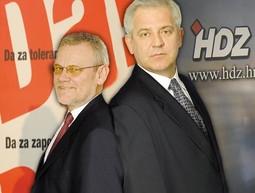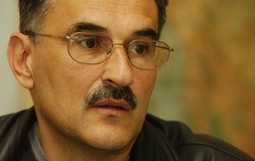Published in Nacional number 576, 2006-11-27
 The regulation of election campaign financing, where massive funds change hands and where collusion is created between politicians and businesses, is not covered by a single article of the Political Party Financing Act, backed by MP's in Parliament.
The regulation of election campaign financing, where massive funds change hands and where collusion is created between politicians and businesses, is not covered by a single article of the Political Party Financing Act, backed by MP's in Parliament. When MP's in Croatian Parliament last week backed the adoption of the Political Party Financing Act in the first round of voting, they in reality legalised a fraud that may have a significant affect the outcome of the parliamentary elections scheduled for the end of 2007. And however much this legislation partially regulates the financial policies of our parties, it definitely by no single article encompasses the financing of election campaigns where massive funds change hands and where alliances are forged between parties and leading local and national companies. Given that the first estimates indicate that at least 100 million kunas are to be spent in the 2007 election campaign, it is clear that this is a legalisation of corruption.
"A figure of a hundred million is too small, you can trust that just the HDZ will spend around that much on the parliamentary campaign. The 2007 elections will be the peak of extravagant spending as all polls indicate the HDZ and SDP are running neck and neck, and this is the last chance for Ivo Sanader and Ivica Racan to be remembered as the prime minister that brought Croatia into the European Union. That is why both teams have already started collecting campaign funds, and the lobbying is being led among the CEO's of large companies, that in that way buy the favour of policy makers. The same thing goes on in other countries, from the United States to France, except that there it is known exactly who paid and how much. In Croatia it is in everyone's interest that this remain a secret because the, often dirty, links between political parties and some companies might otherwise come to light," Nacional was told by an MP well-connected with the Government's cabinet.
Croatian Government has found itself under scrutiny from Brussels, which has on several occasions warned of corruption among our political parties and politicians. A recent European Commission report explicitly criticises the current state of affairs: "Other aspects of electoral reforms mentioned in previous reports remain to be definitively addressed, notably the regulation of the financing of political parties and electoral campaigns, out-of-country voting as well as the updating of the voters’ lists. " The only document that could address this situation is an Election Campaign Financing Act, but Government has not even discussed its drafting. The result is complete anarchy, which suits everyone because there are no rules, to say nothing of restrictions. Indicative of the kind of disproportion at work here is a piece of information from the last presidential elections where Jadranka Kosor announced that her campaign had cost somewhat over 6 million kunas, while independent analysts claimed that, considering the number of advertisements there were, the figure had to have been about ten times greater. Besides, if their official reports are to be believed, the political parties are not that well off. The official revenues in 2005 of the HDZ and SDP came out to 25 million kunas, for the HSS 10, the HSP 5.3, and the IDS and HNS around 4.5 million. But the significant bit of information is that in the electoral year 2003, the revenues of parties were 30 percent greater, and that one third of the money donated to their accounts came from unknown sources. In spite of this, in the 15 years that have passed since Croatia became a sovereign state, the State Auditor's Office has not once investigated the operations of a parliamentary party.
Minimal projections indicate that the expenditures per party at the next parliamentary elections will come out to some ten million kunas. If we take into consideration that some 7 to 8 relevant political parties operate in Croatia, and that at least some twenty more small ones will run at the elections, a figure of a hundred million for the campaign is the lower limit of pre-election spending. As Government has not drafted an Election Campaign Financing Act, the money used here and the method whereby it is collected, will remain more or less without supervision. True, there is a scenario of which there has been talk of in political circles over the past few weeks, that boils down to the leading parties having already launched their funding campaigns and that there is a possibility that in the spring of 2007 this legislation will enter parliamentary procedure. By then they will have already collected the money they need and after that the whole thing can be legalised.
 In these circumstances, it is not surprising that during the debate in parliament last week none of the parties explicitly demanded the adoption of legislation that would cover only campaign financing. Instead of by political parties, this issue is being discussed by non-governmental organisations, above all by GONG (Citizens Organised In Monitoring Elections), whose experts have on several occasions suggested that new legislation be adopted. GONG vice president Dragan Zelic claims that corruption is protected in this way because nobody knows who the party donators are, or how much money they have given to individual parties. The problem here is not the Political Party Financing Act because this is a good document. "This act has some real improvements in relation to the existing situation, however, the financing of election campaigns continues to be unregulated. The payment to a central party account will make it easier to follow the flow of donations. What is particularly good is that anonymous donations are prohibited because up to now there was little supervision during campaigns of persons and companies making donations. Without the data on companies or individuals who are giving their money to political parties, however, the public will not know whether parties are making decisions afterwards for the benefit of the people or of their sponsors" says Dragan Zelic.
In these circumstances, it is not surprising that during the debate in parliament last week none of the parties explicitly demanded the adoption of legislation that would cover only campaign financing. Instead of by political parties, this issue is being discussed by non-governmental organisations, above all by GONG (Citizens Organised In Monitoring Elections), whose experts have on several occasions suggested that new legislation be adopted. GONG vice president Dragan Zelic claims that corruption is protected in this way because nobody knows who the party donators are, or how much money they have given to individual parties. The problem here is not the Political Party Financing Act because this is a good document. "This act has some real improvements in relation to the existing situation, however, the financing of election campaigns continues to be unregulated. The payment to a central party account will make it easier to follow the flow of donations. What is particularly good is that anonymous donations are prohibited because up to now there was little supervision during campaigns of persons and companies making donations. Without the data on companies or individuals who are giving their money to political parties, however, the public will not know whether parties are making decisions afterwards for the benefit of the people or of their sponsors" says Dragan Zelic.
A positive solution he feels are the additional funds allotted for parties having female MP's, and the ban on contributions from companies and individuals who owe money to the state. Besides that, political parties are not allowed to force companies to finance them, offering business privileges in return. Payments made from companies in which the state has a majority package are forbidden, however, party funding is still possible for companies in which the state's stake is, for example, 49%. Some other articles, besides, are also unclear so that it will be in the future difficult to discover how much revenues from membership dues amount to, the nature and value of gifts received by parties and what revenues are earned from ownership. Among the latter are huge properties rented out by the HDZ and SDP, from which they garner millions in revenue. Although they rarely speak of it, renting is among the basic branches of business of the leading political parties in Croatia.
Which is why the jealousy of some MP's, like that of Croatian Party of Rights (HSP) deputy Pero Kovacevic, is not surprising. He accused Sanader's government of writing the law just for the SDP and HDZ. Kovacevic claims that the HSP's annual revenue is about 2.5 million kunas and that the Political Party Financing Act in its proposed form will not improve the current situation. "There should be better regulation of the issue of financing on the part of legal entities as contributions from companies are limited to a million kunas, but there is no mention made of prohibiting payments from sister companies. Naturally even greater doubts are caused by the lack of regulation of the methods of financing election campaigns, and it has up to now been anything but transparent," says Kovacevic.
If Government does not adopt a law on campaign financing, the next European Commission report will be negative. In other words, while silence reigns in Zagreb on election irregularities, Brussels is on their account keeping Croatia at a distance from the European Union. That this is not nitpicking is attested to by the fact that the lists of voters have not been brought up to date since 1990 and that nobody today knows how many voters have passed away in those 15 years.
The 2005 presidential elections demonstrated how one could manipulate the deceased – 6000 persons voted in Capljina in the first round. An ensuing investigation confirmed that there were deceased among them as well as some living persons who did not in fact go to the ballot boxes at all. When the number of observers at polling stations was increased in the run-off vote, only 3000 turned out to vote, even though it was the final ballot.
Dragan Zelic, vice-president of the non-governmental association GONG, involved in election monitoring, feels that the adoption of legislation on the financing of political parties is just pulling the wool over people's eyes until legislation is adopted on the financing of election campaigns. The people at GONG are convinced that contributions from real and legal entities should be limited – 90,000 for real persons and 1,000,000 kunas for legal entities are, in their opinion, excessive figures, and further confusion is contributed by the option based on which some of the funds can be made payable to the accounts of local party branches. Nobody can check on where money for political parties is coming from and what it is being spent on, and the situation will not improve if that role is taken over by the Finance ministry – controlled by the ruling party.
Related articles
Sanader’s eight fear SDP — Won’t bring down Government
Despite forecasts that he would, former Croatian Prime Minister Ivo Sanader, who recently took his seat in Parliament, will not work from the house… Više
Latest news
-
28.10.2010. / 14:15
'A profitable INA is in everyone's interest'
-
28.10.2010. / 09:38
Sanader’s eight fear SDP — Won’t bring down Government
-
21.10.2010. / 15:02
Interior Ministry turned a blind eye on Pukanic assassination
-
20.10.2010. / 09:34
Barisic could bankrupt HDZ




